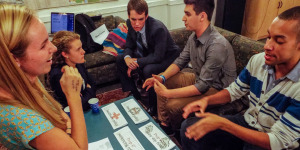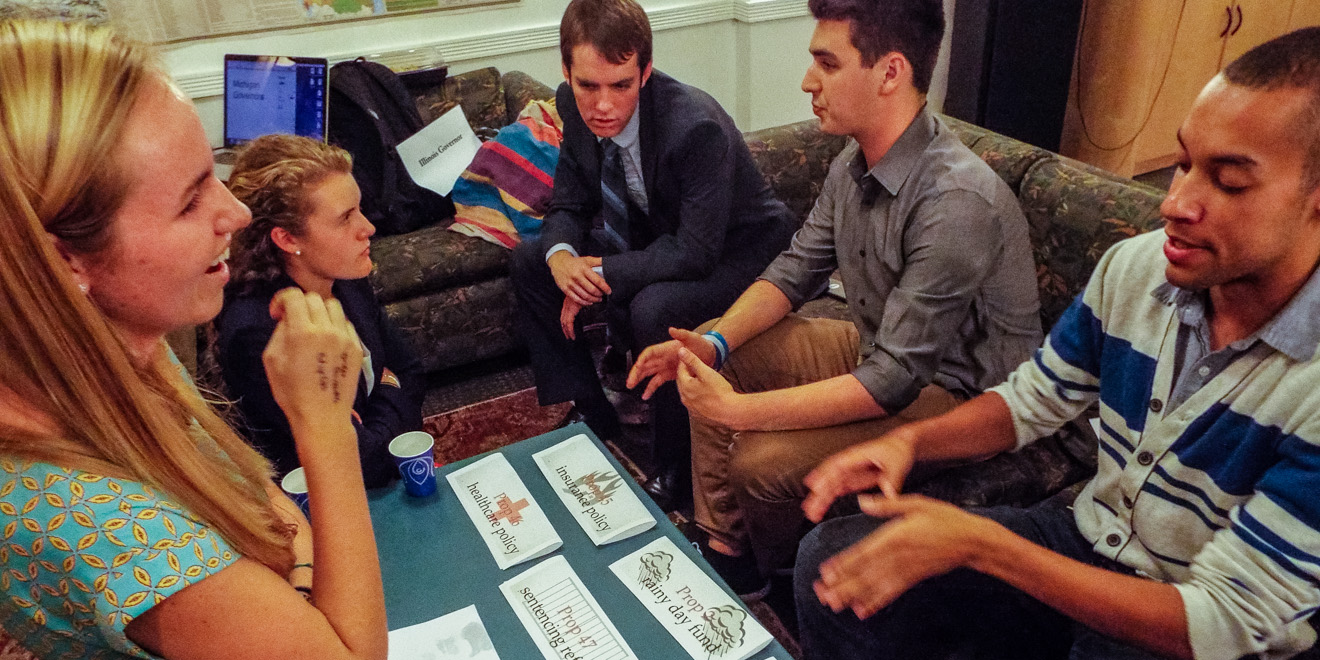
(ERIC THONG/The Stanford Daily)
Stanford in Government’s efforts to promote political engagement and voter turnout for the midterm elections peaked with “Candidates,” a midterm election information session hosted at Slavianskii Dom last Thursday.
The event, modeled after speed dating, brought together students to learn about various controversial electoral races around the nation. Students had the opportunity to talk to pairs of Stanford in Government (SIG) members who had researched in depth a particularly heated race of their choosing. Elections covered included Senate races in Kentucky, Georgia and North Carolina, House of Representatives elections in California’s 17th and 21st Congressional Districts and several different California Propositions on the ballot this Tuesday.
“We thought [a speed-dating format] would be the most fun,” said SIG member Grace Wu ’18. Wu spoke to students at the event about the race between Mike Honda and Ro Khanna in California’s 17th Congressional District.
“It’s a very controversial race because Mike Honda has been here a long time and Ro Khanna is a newcomer who has never held an elected position before,” Wu said. “It could go either way.”
The event’s unconventional format underscored SIG’s commitment to make it as approachable as possible. Attendees of the event sat on couches, ate snacks and even received resumes from mock candidates.
“We want as many students as possible to engage in these issues,” said Stefan Norgaard ’15, the current Stanford in Government Chair.
SIG has traditionally been composed mostly of students studying political science, public policy and other majors that lend themselves easily to political engagement. In the past few years SIG has begun efforts to change that.
“If there’s one thing we found so far this year, it’s that our organization is more successful and also more fun and more powerful when we have these different perspectives coming together,” Norgaard said. “A room full of political science majors isn’t going to have the energy or the potential to galvanize the campus community like a diverse group of students from all different backgrounds.”
In addition to information sessions, SIG holds several voter registration events leading up to November elections.
“We’ve been in dining halls, we’ve been at different political events, we’ve been out in White Plaza doing lots of really cool campaigns in order to make sure that students know why they should be registered,” said Anna Blue ’16, director of SIG’s Public Policy Forum. “This year has actually been our most successful year so far.”
SIG’s ultimate goals stretch far beyond election season. They work throughout the year to create a culture of civic and political engagement at Stanford. SIG holds regular events throughout the year, such as trivia nights, peer panels and policy lunches with members of the Stanford faculty. Past speakers at special events have included former Vice President Al Gore, Senator Olympia Snowe and, most recently, General Michael Hayden.
“I think it’s made me more interested in politics and getting other people interested, not necessarily in politics, but just in being involved in general,” said SIG member Kendra Ritterhern ’18. “I can definitely see myself and my perspective changing.”
SIG’s success in these areas throws into doubt a common perception that Stanford students are apathetic towards politics.
“In my general career as a Stanford student I have found that students are very politically inclined and so that myth mystifies me,” Blue said. “I think if you look at OrgSync and you see the number of registered political groups on campus, I think that alone is a testament to the types of students at Stanford.”
SIG helped register over 800 voters this fall, an increase of four percent from 2012. So many students showed up to hear General Hayden speak this October that Cemex Auditorium was full 15 minutes before the event was schedule to start. Last year, SIG received hundreds of applications for the 40 political fellowships it offers each summer.
“I think people are really interested in and motivated by politics and getting engaged and thinking about how to enact change at the level of institutional reform and public policy, but people don’t necessarily have the platform on which to conduct that engagement,” Norgaard said.
“By providing an opportunity… for all Stanford students to participate in the experience we’re actually seeing a pretty exciting response,” he added.
Contact Nathaniel Okun at nokun ‘at’ stanford.edu.
